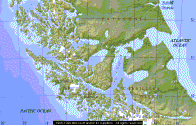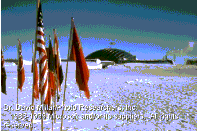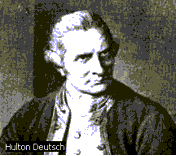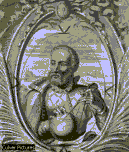| |
 |
|
|
|
 |
 The Strait of
Magellan The Strait of
Magellan
The Strait of Magellan is a channel connecting the Atlantic
and the Pacific Oceans. It carves a rough V-shaped passageway
through Chile, separating the southern tip of the South
American mainland from the mountainous islands of Tierra del
Fuego. The strait is quite narrow-only 3 kilometers (2 miles)
wide at some points. This well-known waterway was named for
Portuguese explorer Ferdinand Magellan, who navigated the
strait in 1520. It has long been legendary among mariners for
its fearsome weather.
The South Pole
The South Pole, the southern end of the earth's axis, is a
point near the icebound center of the Antarctic continent.
This geographic point is located about 2,600 kilometers (about
1,600 miles) from the Magnetic South Pole, the point to which
a magnetic compass needle is attracted. The South Pole was
first reached on 14 December 1911, by the Norwegian explorer
Roald Amundsen.
Amundsen-Scott Base at the South Pole

Because of its severe cold weather, Antarctica was the last
continent to be explored. In December 1911 Norwegian explorer
Roald Amundsen was the first to reach the South Pole. A
disappointed Englishman, Robert Falcon Scott, arrived just a
month later, in January 1912. In 1991, 39 nations agreed to a
treaty that addresses pollution concerns, limits tourism, and
bans activities in Antarctica that do not have a scientific
purpose.
|
|
|
|
|
|
| |
|
 |
|
|
|
 |
JAMES COOK
 James
Cook (1728-1779) was the greatest Britain navigator. After
receiving a modest education, he apprenticed at a small shop
on the Yorkshire coast where he developed a love for the sea.
Cook enlisted in the Royal Navy in 1755. Sent to America
during the French and Indian War, he made soundings of the St.
Lawrence River in preparation for the British attack on
Quebec. Cook's notable charts of the St. Lawrence earned him a
commission as surveyor of Newfoundland. In 1768 he was
promoted and sent to the Pacific with an astronomical
observation group where he surveyed Tahiti, New Zealand, and
Australia. On his famous second expedition (1772-75) he
explored Antarctica. In 1776 he undertook his third and final
voyage in which he explored the West coast of North America
and tried to locate a passage between the Atlantic and Pacific
oceans. On this voyage he discovered the Hawaiian Islands
(which he named the Sandwich Islands), and sailed up the coast
of North America through the Bering Straits to the Arctic
Ocean. He concluded that a usable passage to the Atlantic
Ocean did not exist. On his return he was killed by Hawaiian
islanders. James
Cook (1728-1779) was the greatest Britain navigator. After
receiving a modest education, he apprenticed at a small shop
on the Yorkshire coast where he developed a love for the sea.
Cook enlisted in the Royal Navy in 1755. Sent to America
during the French and Indian War, he made soundings of the St.
Lawrence River in preparation for the British attack on
Quebec. Cook's notable charts of the St. Lawrence earned him a
commission as surveyor of Newfoundland. In 1768 he was
promoted and sent to the Pacific with an astronomical
observation group where he surveyed Tahiti, New Zealand, and
Australia. On his famous second expedition (1772-75) he
explored Antarctica. In 1776 he undertook his third and final
voyage in which he explored the West coast of North America
and tried to locate a passage between the Atlantic and Pacific
oceans. On this voyage he discovered the Hawaiian Islands
(which he named the Sandwich Islands), and sailed up the coast
of North America through the Bering Straits to the Arctic
Ocean. He concluded that a usable passage to the Atlantic
Ocean did not exist. On his return he was killed by Hawaiian
islanders.
 Cook’s
exploration of the Pacific coast was momentous, though fraught
(filled) with errors. He missed the mouth of the Columbia
River (then known as the Oregon River or River of the West),
as well as the Juan de Fuca Strait, a passage into Puget
Sound. He also mistook Vancouver Island for the mainland.
Despite these oversights, Cook's third voyage significantly
increased knowledge of and interest in the Northwest. Cook's
chart of the Pacific coast served as a chief reference source
for Nicholas King as he prepared his map of America for the
Lewis and Clark Expedition in 1803. More significantly, Cook's
widely read accounts of his voyage provided fascinating
descriptions of the indigenous peoples in the Pacific
Northwest and publicized the brisk trade between the Hudson's
Bay Company and the Indians. Cook incidentally discovered that
the sea otters trade was able to bring enormous profits in the
markets of Canton, China. Upon the 1783 publication of an
unofficial account of Cook's third voyage and the release of
the official account the following year, Britain, France, and
the new United States joined Spain and Russia in the contest
for control of the Pacific Northwest and the sea otter trade. Cook’s
exploration of the Pacific coast was momentous, though fraught
(filled) with errors. He missed the mouth of the Columbia
River (then known as the Oregon River or River of the West),
as well as the Juan de Fuca Strait, a passage into Puget
Sound. He also mistook Vancouver Island for the mainland.
Despite these oversights, Cook's third voyage significantly
increased knowledge of and interest in the Northwest. Cook's
chart of the Pacific coast served as a chief reference source
for Nicholas King as he prepared his map of America for the
Lewis and Clark Expedition in 1803. More significantly, Cook's
widely read accounts of his voyage provided fascinating
descriptions of the indigenous peoples in the Pacific
Northwest and publicized the brisk trade between the Hudson's
Bay Company and the Indians. Cook incidentally discovered that
the sea otters trade was able to bring enormous profits in the
markets of Canton, China. Upon the 1783 publication of an
unofficial account of Cook's third voyage and the release of
the official account the following year, Britain, France, and
the new United States joined Spain and Russia in the contest
for control of the Pacific Northwest and the sea otter trade.
After the third voyage of Captain Cook, one of Cook
sailors, the American John Ledyard, wrote an unofficial
account of the journey. Ledyard tried, unsuccessfully, to
raise a fur-trading expedition to the Northwest in 1784-85. In
1785 he met Thomas Jefferson and the two quickly became
friends. Jefferson, then ambassador to France, owned three
unofficial versions of Cook's Third Voyage, including Ledyard,
as well as the official account of 1784. These accounts, as
well as the renewal of French interest in the Pacific
Northwest signaled by La Pérouse's expedition, strengthened
Jefferson commitment to finding a path to the Pacific.
Jefferson, in fact, sponsored Ledyard's bizarre expedition of
1787-88 to cross Russia, travel to the Northwest coast of
North America by ship, and then find a route to the Missouri
by traveling from west to east. Ledyard got as far as Siberia
before being arrested by Russian authorities under Catherine
the Great.
Christopher Columbus
 Italian-born explorer
Christopher Columbus broke with tradition in 1492, sailing
west in an attempt to find a shorter route to India and China.
Columbus based his calculations for the journey on Biblical
scripture, specifically the books of Esdras in the Apocrypha.
On August 3rd, 1492, Columbus departed from Palos de la
Frontera, Spain, on the first of several voyages to what he
later called the “New World.” Italian-born explorer
Christopher Columbus broke with tradition in 1492, sailing
west in an attempt to find a shorter route to India and China.
Columbus based his calculations for the journey on Biblical
scripture, specifically the books of Esdras in the Apocrypha.
On August 3rd, 1492, Columbus departed from Palos de la
Frontera, Spain, on the first of several voyages to what he
later called the “New World.”
Ferdinand Magellan
Ferdinand Magellan was born in Sabrosa Portugal in 1480
and got killed in 1521 in a battle in the Philippines
1480-1521. 
On the 20th of September 1519, Magellan left Spain with 277
men and five ships: the Trinidad, the Vittoria, the Concepcion,
the Santiago and the San Antonio. The ships went across the
Atlantic Ocean and went along the coast of South America.
Magellan was looking for a strait leading from the Atlantic
into the Pacific. In January 1520, He thought he had found it
but was very disappointed to discover that the “strait” was
the mouth of a river. Three were other setbacks. He had to put
down a mutiny and shortly after the San Antonio was wrecked in
a storm. However, Magellan pressed on and in October he found
the channel which led to the Pacific. It is still known as the
Strait of Magellan.
After Magellan's journey he sailed to the Phillippines to
stock up on food and sadly he did not make it back because he
was killed in a battle on one of the Phillippines islands.
|
|
|
|
|
|
| |
|
 |
|
|
|
 |
1.掌握下列词语用法
1.store
2.fall ill
3.insist on doing
4.live
5.take an interest in
6.suggest doing
7.exist
8.take…by
9.surprise
10.order
11.stores of food
12.chart
13.set out
14.suffer
15.fever
16.defeat
|
17.set sail
18.provide sb
19.with
20.seize
21.be worth doing
22.go bad
23.raise
24.pass by
25.hear of
26.crew
27.in charge of
28.from now on
29.in search of
30.pay for one's schooling
31.sink
32.astonish |
2.掌握表达“决定和坚持”的交际用语
I have decided to do sth.
I insist on doing sth.
I (shall) insist that sb. (should) do sth.
We will do sth.
3.掌握下列句型
insist + that从句
They found Australia to be an astonishing land…
It is a good, strong ship, though not very fast.
Cook knew that sailors often suffered fever while at sea…
4.复习动名词
|
|
|
|
|
|
| |
|
|
 |
[基础知识]
1.词法
(1) astonish
【说明】
a) vt.使……惊讶 The news astonished me.
b) astonishing adj.令人惊讶的 The news is astonishing.
c) astonished adj.
I was astonished when I heard the news.
我听到这个消息非常震惊。
(2) insist on doing
【说明】
He insisted on his innocence(无罪).
She insisted on joining in the game.
(3) be worth doing
【说明】 值得的
The film is worth seeing.
It is not worth waiting for him.
不值得等他。
(4) seize
【说明】 vt.强占,夺取,(突然)抓住,领会(意思)
The enemy seized the fort.敌人夺取了要塞。
The host seized my hand and shook it heartily.
They seized the occasion to invite us to visit their
country.
I can't quite seize (=grasp) your meaning =I can hardly
understand you=I have
no sense of your words.
(5) find + sb./sth.+(to be)+n./adj.
【说明】动词find后跟不定式复合结构,意思是“发现/觉得某人/某事是什么人/事或怎么样”;不定式to
be可以省略 The students find this book (to be) a useful
one/very useful.
I found him to be an easy person to get along with.
[练习题]
1. Wang Lin insisted on _____to work in the countryside.
A. be sent B. sending C. being sent D. send
2. These books are worth______.
A. to buy B. buying
C. being bought D. of buying
3. His parents insist on ______ to college.
A. he go B. he should go
C. his going D. him to go
4. Can you ____my meaning?
A. get B. catch
C. seize D. each of the above
5. I find her____ about her dress.
A. careless B. to be careless
C. being careless D. Either A or B
2.语法
动名词
【说明】动名词具有动词的一些特征,又具有名词的句法功能。
a) 动名词结构

b) 动名词做主语:动名词做主语谓语要用单数。
Seeing is believing.
Helping her is my duty.
动名词做主语通常用it形式主语代替,注意以下句型:
It is no good/no use/a waste of time doing that.
c) 动名词做宾语:在一些动词后要用doing做宾语,要熟记这些动词。这些动词有:
finish;advise;practise;enjoy;allow;miss;suggest;permit;imagine;consider;
delay;keep; mind;dislike; stop;admit;escape;keep;
在介词后动词用ing形式
insist on;succeed in; keep on;spend…in;give up;prevent…from;feel
like;put off;
注意以下短语中to是介词
look forward to; pay attention to; devote…to; object to;
refer to;be/get used to;
stick to
David suggested going to the Great Wall.
I'm sorry to have missed seeing you in Beijing.
Would you mind my opening the door?
I'm used to getting up early.
[练习题]
1.It's no use _____a lot without _____anything.
A. talking; doing B. to talk; doing
C. to talk; being done D. talking; to do
2.----What made you so upset?
----_____my new bike.
A. Lost B. Losing
C. Because of losing D. Since I lost
3.Can you imagine_____ as a nurse?
A. him work B. him working
C. he working D. him to work
4.The old man's ____ pity on the snake led to his own death.
A. to take B. taking
C. being taken D. having taken
5.----Is Henry sick?
----Yes. _____all night in the rain caused him to catch a
cold.
A. He worked B. To have worked
C. Working D. His working
6.It's a good habit to practise____ English aloud in the
morning.
A. to read B. reading
C. in reading D. to be reading
7.The squirrel was lucky that it just missed_____.
A. catching B. to be caught
C. being caught D. to catch
8.The mother warned her son against ____ with other boys.
A. fight B. to fight
C. fighting D. fought
|
|
|
|
|
|
| |
|
 |
|
|
|
|
|
 |
[拓展知识]
1.词法
(1) insist that, suggest that
[说明]that 从句有两种情况,谓语动词有两种结构: 虚拟语气(should do)和直陈语气; insist
that用虚拟语气意思是 “坚决要求某人做某事”,用直陈语气表示 “坚持认为”。suggest
that用虚拟语气意思是 “建议某人做某事”,用直陈语气表示 “表明,暗示”。
I insist (that) he (should) come with us.
He insisted (that) the work (should) be started at once.
He insisted (that) he heard something downstairs.
He suggested (that) we (should) try it again.
His expression suggested (that) he was angry.
(2) at sea, at school, at table, at desk, in hospital, in
prison, in bed
[说明]注意在这些短语中,有无the意思不同。
at school 在上学/在校学习
at the school 在学校
at table 在吃饭
at the table 在桌边
in hospital 生病住院
in the hospital 在医院
in prison 坐牢 in the prison 在监狱
(3) charge ,in charge of, in the charge of
[说明]a) chargevt.交给……任务,嘱咐,托付,要求,命令;控告,指控,指责;收(费),索
(价);使装满,使充盈,充电
Mother charged Alice to take care of the baby.
I charged this man with receiving stolen goods.
He was charged by the police with breaking the law.
They charged that the police had beaten three students to
death.
We won't charge anything to that.
How much do you charge for a haircut?
The air was charged with vapor.
The atmosphere was tense and charged with fear.
The young man is always charged with strength and power.
The man in the garage said he would charge up my car
buttery.
b) in charge of 某人主管、负责某事/某部门
As the captain of the team, you should be in charge of
everything.
Mr. Smith is in charge of our class.
c) in the charge of sb./in one's charge 某事/某部门由某人主管、负责
Our class is in the charge of Mr.Smith.
The hospital is in the charge of her until the director
comes back.
(4) search ,in search of, search for
[说明]a) search vt.搜查,在……搜寻,搜(身);n. 搜寻,找寻
The police searched every room in the house.
The police searched the prisoner to see if he had a gun.
I've searched my memory, but I can't remember that man's
name.
The search for the little girl went on all day.
b) in search of 搜寻,
They set out in search of the missing boy.
Not all birds fly south in search of winter sun.
c) search for 搜寻,寻找
They are searching for the missing boy.
They are searching the woods for the missing boy.
(5) pass by和go by 的区别
[说明]pass by意思是“经过、路过”,通常后面跟地点做介词的宾语,by为介词;go by
指“(时间)过去”,后不带宾语时by为副词。
When you passed by the post office, don't forget to post
my letters for me.
(6) crew, team, group, party, family
[说明]这些集体名词指整体时做单数,指所有各个成员做复数
The crew get together on the board.
The crew consists of 20 people.
(7) astonish astonishing astonished
disappoint disappointing disappointed
excite exciting excited
interest interesting interested
…
[说明]注意这类词用法:v+ing形容词说明主语性质;v+ed形容词说明主语状态,有被动意义。
[练习题]
1. Mr. Wang is ____the library while the lab is ____ his wife.
A. in charge of; in charge of B. in the charge of; in charge
of
C. in charge of; in the charge of D. in the charge of; in
the charge of
2. Jane's uncle insists____in this hotel.
A. on not staying B. not to stay
C. that he not stay D. Either A or C
3. Madam Curie worked day and night _____the unknown matter,
A. search for B. searching for
C. in search of D. either B or C
4. The doctor suggested ____next week.
A. that I come again B. that I should come again
C. my coming again D. each of the above
5. His pale face suggested _____.
A. that he should be ill B. that he be ill
C. that he is ill D. he was ill
6. As time ____, they came to ____ nobody, for they were
always cheated not only by words
but also by deeds.
A. passed by; believe B. flew by; believe in
C. passed on; believe D. went by; believe in
7. The film made all of us _____. It is really_____.
A. disappointing; disappointed B. disappointed; to be
disappointing
C. disappointed; disappointing D. feel disappointing;
disappointing
2.语法句法
(1) 
[说明]这些动词后既可跟doing,又可跟to do, 意思一样。
When did you begin learning (to learn) English?
(2) 
[说明]这些动词后用doing还是to do做宾语,意思稍有不同:跟doing表示“经常的、
习惯的动作”,“一种爱好”; 跟to do表示“一次的动作”。
I like swimming, but I don't like to swim today.
(3) stop : stop doing 停止做某事
stop to do 停下来做某事
try: try doing 尝试做某事
try to do 试图、努力做某事
forget:forget doing 忘了做过某事
forget to do 忘了做某事
remember:remember doing 记得做过某事
remember to do 记住做某事
mean: mean doing 意味着做……
mean to do 意思是做……
regret: regret doing 后悔做过某事
regret to do 遗憾、抱歉地说、告诉
go on : go on doing 继续做(同一件事)
go on to do 继续做(另一件事)
[说明]这些动词后用doing还是to do做宾语,意思不同,要分别记忆。总之,doing表示已
做的动作,to do表示未做的动作。
I remember telling her all about it.
I will remember to tell her all about it.
I regret telling you the truth.
I regret to tell you that you failed the exam.
(4) 
[说明]这些动词后用doing, doing与主语是被动关系,相当于to be done;跟to do, to
do与主语是主动关系, 主语是to do的逻辑主语.
Some of the work needs doing(=to be done) again. But you
have finished your part
well,so you don't need to remain here.
The plants want watering.
(5)
[说明]can't help doing情不自禁做某事, can't help (to) do不能帮助做某事
We couldn't help laughing when we heard the funny story.
I can't help (to) wash the dishes because I am busy
preparing for the entrance exams.
[练习题]
1. We are looking forward to _____another chance ____ it
again.
A. be given; to try B. give; trying
C. giving; trying D. having; to try
2. I am the boss here! I'm not used to _____what to do.
A. told B. telling
C. be told D. being told
3. ---I _____ it out in this way, but I failed.
---Why ____it some other way?
A. tried to work; not try doing B. tried to work; not try to
do
C. tried working; not try to do D. try to work; not try
doing
4. We don't need ____so early this time.
A. leave B. left C. to leave D. leaving
5. The patient needs ____good care of, ____he?
A. taking; needn't B. taking; doesn't
C. to be taken; doesn't D. Either B or C
6. I remember ____ the book to you last week.
A. bringing B. bring
C. to bring D. brought
7. Go on ____ the other exercise after you have finished this
one.
A. to do B. doing
C. with D. to be doing
|
|
|
|
|
|
| |
|
 |
|
|
|
|
|
| |
| |
| |
| |
| |
| |
| |
| |
|